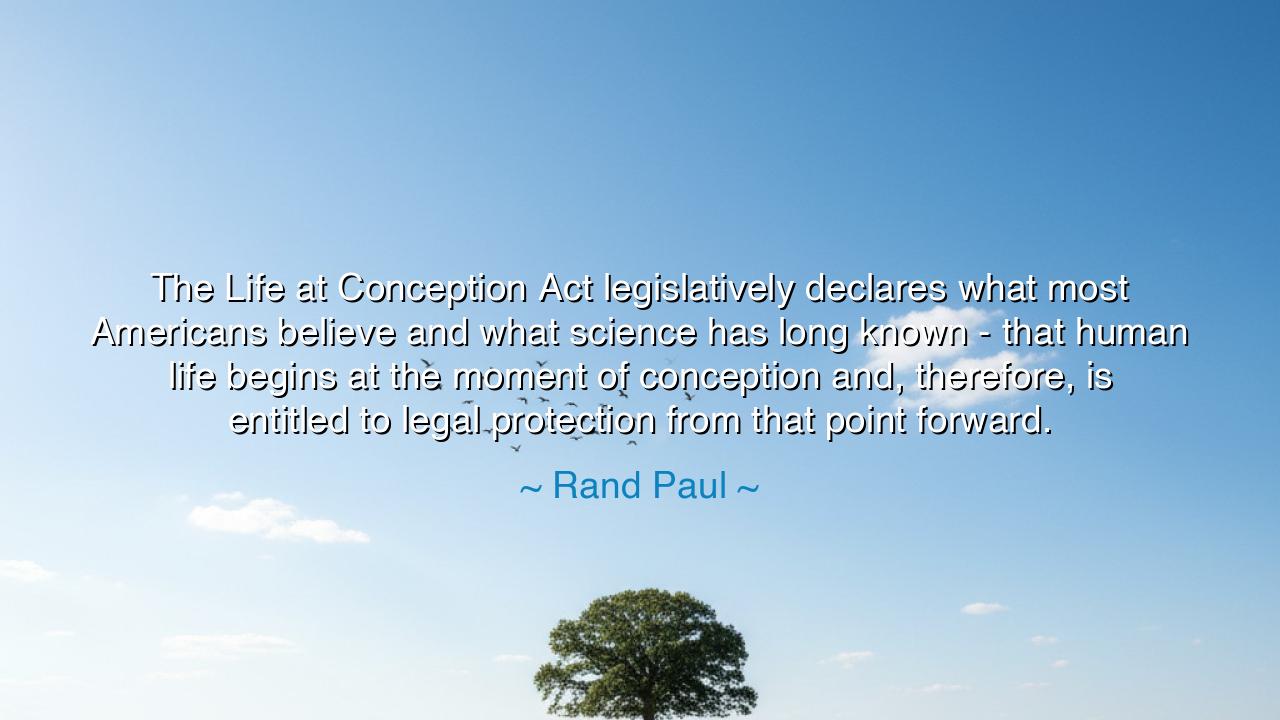
The Life at Conception Act legislatively declares what most
The Life at Conception Act legislatively declares what most Americans believe and what science has long known - that human life begins at the moment of conception and, therefore, is entitled to legal protection from that point forward.






In the annals of human thought and law, few questions have stirred as much moral, philosophical, and societal debate as the beginning of life. Rand Paul’s words, “The Life at Conception Act legislatively declares what most Americans believe and what science has long known - that human life begins at the moment of conception and, therefore, is entitled to legal protection from that point forward,” illuminate a principle both ancient and enduring: that life, in its earliest form, possesses an intrinsic dignity and a claim to protection under law. Here lies a meditation on morality, science, and civic responsibility, echoing the timeless concern of civilizations to safeguard the vulnerable and innocent.
From the city-states of Greece to the republics of Rome, philosophers and lawmakers wrestled with the nature of human life, personhood, and the obligations of society toward its youngest members. Aristotle debated the stages of development, while Roman law recognized certain protections for the unborn. Paul’s reflection situates this ancient discourse in the modern legislative arena, asserting that the ethical and scientific recognition of life at conception demands legal codification. To recognize life is to acknowledge both moral duty and civic responsibility.
History offers vivid illustration. In medieval Europe, laws often protected children and fetuses in cases of harm or violence against pregnant women. Legal recognition of prenatal life, though varied, reflected a moral intuition: that the most vulnerable merit protection. Similarly, the Life at Conception Act seeks to enshrine this principle formally, translating longstanding belief and scientific understanding into legislative authority. Paul emphasizes that protection is not merely symbolic but actionable, establishing legal rights from the moment of conception.
Consider a contemporary example: the development of neonatal care and the recognition of fetal viability in the 20th century. As science advanced, medical professionals understood that life begins at conception and progresses through measurable stages. This understanding informed both ethical debate and legal frameworks, influencing policy decisions about maternal health, research, and protection. Paul’s legislative effort mirrors this historical interplay of knowledge and law, codifying moral and scientific insight into civic duty.
The philosophical resonance of this statement is profound: the sanctity of life is inseparable from the obligations of society. Just as the ancients considered the protection of the weak a foundation of justice, modern law must consider the unborn as part of the moral and legal community. Recognizing life at conception is not merely a scientific acknowledgment but a reflection of society’s commitment to justice, dignity, and ethical stewardship.
For lawmakers and citizens, the lesson is both ethical and practical. Societies are judged by the protections they afford to their most vulnerable members. Legislative action, informed by both scientific understanding and moral conviction, is a means of ensuring that these protections are not merely aspirational but enforceable. Paul’s words urge vigilance in translating belief and knowledge into frameworks that uphold the inherent worth of life.
Practically, this teaching calls for informed engagement and civic responsibility. Support legislation and policies that protect life, understand the scientific foundations of human development, and participate in public discourse to ensure that ethical principles are reflected in law. By aligning moral conviction with legislative action, society safeguards the unborn while reinforcing the ethical foundations of civic life.
Thus, Rand Paul’s words endure as a timeless exhortation: to recognize life at its earliest stage is to honor both science and morality, and to enshrine that recognition in law is a profound civic duty. Let this reflection guide lawmakers, citizens, and generations yet unborn, reminding all that the protection of life is the measure of a just society, and that legal recognition is both the affirmation and the obligation of humanity’s moral conscience.






AAdministratorAdministrator
Welcome, honored guests. Please leave a comment, we will respond soon